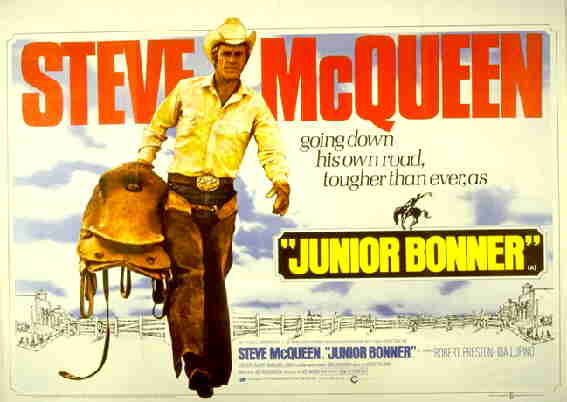2007: Knocked Up
Knocked Up (Apatow, 2007) 4/10
 Since the success of his debut film The 40 Year Old Virgin two years ago, Judd Apatow's stock has been on the rise. Long forgotten have been his mis-steps as a producer ( The Cable Guy) and screenwriter of cinema ( Celtic Pride and beloved, but cancelled television comedies (Freaks and Geeks). The 40 Year Old Virgin wiped Apatow's slate clean.
Since the success of his debut film The 40 Year Old Virgin two years ago, Judd Apatow's stock has been on the rise. Long forgotten have been his mis-steps as a producer ( The Cable Guy) and screenwriter of cinema ( Celtic Pride and beloved, but cancelled television comedies (Freaks and Geeks). The 40 Year Old Virgin wiped Apatow's slate clean. Now Apatow can seemingly do no wrong. His cinematic coagulation of the intoxicated humour of "The Frat Pack" and its comic antecedents has resurrected a career previously mired in Hollywood's comedic backwaters. Apatow's second film Knocked Up is of a similar bent: exploiting physical and perverted wordplay for cheap laughs. The result is a film that while possessing a surprising pseudo-political lilt, ultimately wallows in the hollow nature of its empty thrills.
In the film, Allison Scott (Katherine Heigl) decides to celebrate her promotion to an on-camera position at cable network E! by going to a local nightspot with her older sister Debbie (Leslie Mann). There she meets Ben (Seth Rogen), the lieutenant of a group of drug-addled slacker roomates, who buys her a beer and ends up impregnating her. Over the course of the next nine months, Ben and Allison attempt to establish a relationship with different motives; eventually realizing that not only is the process of an unexpected child difficult, but also the ability to fabricate a romance structured upon an unintended incident.
Underneath its boozy laughs, Apatow's film deals with a serious subject matter: managing to successfully induce humour from a completely humorless situation. In the hands of another director, this would have easily been crafted into a harrowing tale of misguided teenage romance: the stuff of Academy Award nominations. But in Apatow's hands, the film emerges as a bawdy, ribald inversion as fears and heartache are provided a comic foil in Rogen's emotionally inept Ben.
However, Apatow does not merely use his material for pure entertainment. There are scenes in which the director hints with detached coy mannerisms toward sober subject matter such as abortion. Yet, rather than philosophically probe the material, Apatow immediately shys away. No debates, no moral stances or investigations. Rather Apatow proposes a political notion and then backs away.
This reluctance is particularly evident in the rather strained attempts to necessitate Allison's increasing feelings of romance toward Ben. Although Apatow hints at her character's emotional desperation, the director never solidifies a reason for her desire to be with Ben. Thus, Heigl's Allison does not come across as an emotionally strong woman able to utilize the support of her sister and brother-in-law (Paul Rudd) who underwent a similar scenario years earlier.
That is not to say that Apatow neatfully ties up all the loose ends and proposes a fairytale romance for his principal couple. Rather, he does not demonstrate any purpose for their relationship other than their ensuing child. Interestingly, Apatow's approach to the inner workings of relationships appears to be at times vehemently negative.
Apatow's investigations into the on-again-off-again spats between the easy-going Pete (Paul Rudd) and his nitpicking wife Debbie reach a crucial crux over accusations of infideility surrounding music business employee Pete. Yet, when the eventual cause of Pete's desertions is realized, Apatow presents this fact upon liquified ground. Instead of further indulging in and proposing ruminations about society's inability to truly communicate, Apatow fails to provide a balanced examination of failed connections.
On the one hand Pete's folly is both humanly weak and comic, but on the other it lacks a concrete foundation for Rudd's character to be victimized throughout the rest of the film based solely on that discretion. While Pete's failure as a husband could be further investigated, Apatow hinges Rudd's character around one event, which becomes the symbolic definition of his blighted marriage to Debbie. The latter on the other hand, often comes mostly unscathed despite her overt lack of faith in her husband.
Yet, the film's secondary relationship is not the film's greatest misgiving. Rather, Apatow's choice of humour pushes the film into a direction that cannot sustain an aura of timelessness. The overall effect of the film's perverted scripted entries is one bristling in shallow emptiness, demonstrating an overall flatness to the product. Additionally, there are too many unncecessary cameos and namechecks from Apatow's past, Universal's television and film roster, as well as Ryan Seacreast (why?).
Rogen's bumbling nature is adept for secondary roles, but his slack-jawed grin cannot compensate for his stretched talents. Heigl fares slightly better, despite a rather tepid opening twenty minutes drowned in nervy overacting. Yet, the film's two real gems are Rudd and Mann as squabbling couple Pete and Debbie: portrayed with a naive honesty by the two supporting actors. The rest of Apatow's film balances between base drug and sexual jokes and an overtly sentimental romantic tinge, despite the communication breakdowns and chemical disconnections between the characters.
A comedy featuring moments of humour, which is ultimately unable to sustain its firmness beyond the moment.
Copyright 2007 8½ Cinematheque

